Here Is An Innovative Way To Make Flatbed Tarping Much Faster And Much Safer And More Productive For Business.
Topic 23539 | Page 1
Wow, you really have a bee in your bonnet when it comes to tarping. Do you do a lot of it?
I think your are a little too hung up on this. I've only been flatbedding a year now for a major flatbedding company, so someone like oldschool or someone with a small outfit may have a different take, but here's how my year has gone. I tarp pretty much every day. Know how many times I've been on top of a tall load this year without fall protection? Four times. Pretty much any shipper that has more than two employees and ships tall loads daily, either has a way to tarp without you getting on the load, or has a fall protection system in place. Granted, not all shippers do, but my limited experience has shown that any place doing serious business has a system in place, simply to cover their own butt, so that if a driver falls off a load, they are not held responsible. It's a lot cheaper to string a cable between two poles and put a harness on it, than to pay a lawsuit. For example, that load in my profile pic was my biggest, yet lightest load-I never even touched the tarps on that load till they were ready to be bungeed down, the shipper had one guy who did nothing but spread out tarps, so that drivers stayed off the load, and they were a tiny outfit, too. In fact, you'd probably be surprised at the number of places I got to where a driver is not even allowed on the trailer, much less a load.
Secondly, that machine in the video is not unique or innovative. I'm usually using a tarping machine of some kind twice a week. There are dozens of ways to spread a lumber tarp, and some of them are surprising simple yet effective. It's always fun being surprised by what companies come up with.
Thirdly, nothing says you have to walk around on top of a tall load. Get down on your hands and knees to spread the tarp. Makes things feel a lot safer. I often do it, even when wearing a fall arrest harness. Things like paper rolls to me are scarey to walk around on top of.
Fourthly, tarping is not really the horrible job people make it out to be. Granted, there are days, frozen tarps, muddy tarps, rain, wind. But once you've been doing it a while and have learned the techniques that make life simpler, you can mitigate many of the annoying things about tarping. Learn how to "fold" frozen tarps so they still fit in the box, learn how to fold tarps in the wind, heck, learn how to fold tarps off the rub rail, learn how to spread tarps in the wind, etc. Tarping is not that bad a job, I've done worse. Besides, I get a great feeling of pride driving down the road with a well tarped load-shows that you are a professional.
Shipper:
The customer who is shipping the freight. This is where the driver will pick up a load and then deliver it to the receiver or consignee.
TWIC:
Transportation Worker Identification Credential
Truck drivers who regularly pick up from or deliver to the shipping ports will often be required to carry a TWIC card.
Your TWIC is a tamper-resistant biometric card which acts as both your identification in secure areas, as well as an indicator of you having passed the necessary security clearance. TWIC cards are valid for five years. The issuance of TWIC cards is overseen by the Transportation Security Administration and the Department of Homeland Security.
Todd, I'm not sure what makes you think you can come into a trucking forum with zero trucking experience and teach us about innovative practices or products for our field. I've already mentioned how your comments are as comical as they are misinformed, but you insist on continuing to try to teach, rather than making an attempt to learn.
There's nothing innovative about the machine in that video. We've been using those things for probably ten years now. There are even much better ones that pick the whole tarp up while completely spread out, and we simply drive under it as it sets it down on our load exactly where we need it to be. In the last five years I may have tarped outdoors, with no safety nets, maybe ten times at most. Almost any place I go either has tarping machines or safety nets, and the work is done indoors. Many of those places won't allow a driver back on their property if he tries to tarp without using the safety equipment.
You are a victim of misinformation, which is extremely common for people trying to research trucking. We get that, it's totally understandable. What we don't get is your insistence on trying to educate us on something you have no practical knowledge or experience with.
HOS:
Hours Of Service
HOS refers to the logbook hours of service regulations.Here's an example of an "indoor tarping station" as they're called. You back into this thing with walkways and safety rails on each side. You can't fall off when using this station. What you can't see is the stairwell at the rear, which is where I was standing as I took the picture. No ladders, no bad weather, but many people are still not inclined for this type of work.
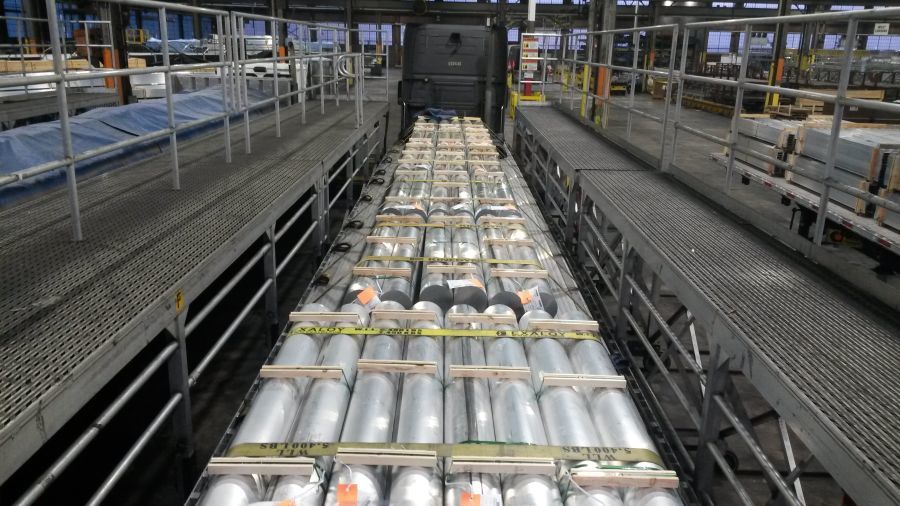
People who generally don't enjoy doing physical work with their own hands don't make very good flatbedders. There's still work involved. No one has come up with a way to secure the tarps with a machine. That's still done by hand with a lot of rubber bungees. It's the same situation when we untap. There's work involved. I even untarped recently in the streets of San Diego because the customer had no staging area for the trucks making deliveries.
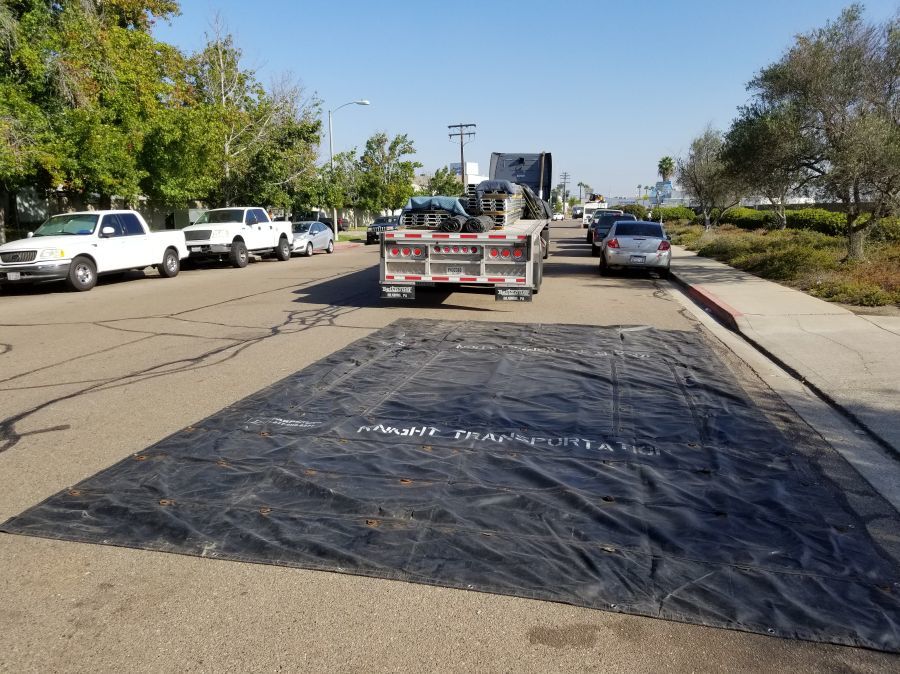
Fortunately, most of my tarp jobs look like this, and are completed in about five or six minutes.
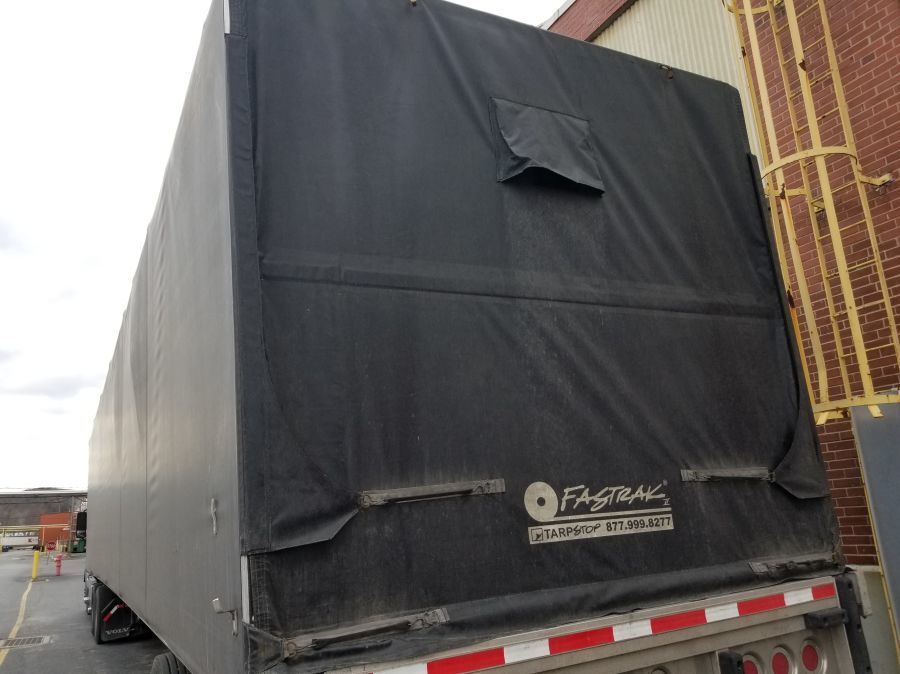
These "Conestoga" trailers are wonderful.
Here's an example of an "indoor tarping station" as they're called. You back into this thing with walkways and safety rails on each side. You can't fall off when using this station. What you can't see is the stairwell at the rear, which is where I was standing as I took the picture. No ladders, no bad weather, but many people are still not inclined for this type of work.
People who generally don't enjoy doing physical work with their own hands don't make very good flatbedders. There's still work involved. No one has come up with a way to secure the tarps with a machine. That's still done by hand with a lot of rubber bungees. It's the same situation when we untap. There's work involved. I even untarped recently in the streets of San Diego because the customer had no staging area for the trucks making deliveries.
Fortunately, most of my tarp jobs look like this, and are completed in about five or six minutes.
These "Conestoga" trailers are wonderful.
Old School: The only thing that scares me about flatbed work is possible fall from a high place. Using all those finicky bungees would not bother me. I have experience tarping landscaping trailers and pickup trucks using either ropes or turnbuckle straps. I also once worked for a landscaper where he loaded his 1953 Ford tractor onto the back of a landscaping trailer and I had to secure it using chains and lever binders. In the army, I was tasked a couple of times to secure military vehicles on railroad flatcars using chains and binders and the civilian inspector at the railhead was fussy about appearance and tightness. The railroad industry doesn't like sloppily-secured loads either. In the army, I both drove and repaired as a light-wheeled vehicle mechanic, diesel military trucks up to Class 5, 20,000 pounds gross, in weight including semis. I have also driven these vehicles off road and in mud but they had transfers to get drive on the front axles. I was also an army recovery operator who operated a medium-duty, 5-ton class, wrecker truck off road too.
Old School, have you ever hauled heavy equipment off road whereby your tractor had all-wheel-drive capability, a transfer case in other words? In one of my threads you told me about serious traction issues on muddy mountain steep roads whereby you needed assistance from a dozer. No, I have no flatbed experience perse, but I do know what negative effects gravity has on the human anatomy when coupled with solid concrete below. I'm only concerned with fall prevention. The possibility of falling out of a truck cab doesn't bother me, as I have clambered into enough tall army trucks, and jumped off the tailgates of 5-tons, about 4 feet, but standing on top of a roof or a tall trailer load without any fall restraint system would give me vertigo.
HOS:
Hours Of Service
HOS refers to the logbook hours of service regulations.If you are so worried about hurting yourself tarping then go dry van or refer.
Dry Van:
A trailer or truck that that requires no special attention, such as refrigeration, that hauls regular palletted, boxed, or floor-loaded freight. The most common type of trailer in trucking.Stick with van or tanker, then?
Old School: The only thing that scares me about flatbed work is possible fall from a high place.
Okay, we got it. That's why I don't understand your fascination with "Heavy Haul" work. Is it just because the trailer is a 'lowboy?" Have you ever considered why those heavy haul drivers need a lowboy trailer? It is because most of their loads are super tall. That low riding trailer allows many of their loads to fit under bridges that they wouldn't normally clear with a regular flatbed trailer, but still they are oftentimes hauling loads that are too tall so that they have to take circuitous routes and have escorts so that they can avoid the hazards involved. You seem to gloss over all the additional requirements, such as the tediously involved permitting and paperwork involved for each state that a heavy haul driver travels through. Many of the states will only allow them to travel during the daylight hours. They have got to stop at every single weigh station, park and go inside to have their paperwork examined, and if they get off of the route they are assigned by each permitting authority they are in some serious trouble. I once had an over-sized load that routed me through some pig trail like roads in Pennsylvania because they were doing construction on the interstate that had the lanes narrowed too much for the width of my load. That was crazy! I was encountering Amish families out in their buggies on these little narrow two lane roads, fearing that I would wipe them off the face of the earth each time we went by each other.
They don't just haul construction equipment. Some of their loads are tarped. I see them almost daily. I don't know what is under the tarps, but it sometimes looks like a huge plywood crate. I have no idea what is inside. My point is that your fear of climbing, or heights, will come into play as a heavy haul driver. You are going to have to have years of flat-bed experience to do that type of work, so you might as well work on getting over your fear of climbing, while learning the flat-bed business. Fears are not things that can't be dealt with. Brett was afraid of heights at one time, then he became a tree climber in a tree trimming business, and now he is climbing rock and ice cliffs. Fears can be overcome.
I am almost sixty years old, and I climb on loads all the time. Most of them have fall protection, but you are going to occasionally be somewhere that doesn't have it. Andhe78 mentioned paper rolls. Here is a shot of me up on top of some paper rolls that are bound for a sheetrock plant. He's right, they are no walk in the park. By looking closely at this photo you will see a full body harness going around my hips, and under my buttocks. It is hooked to a cable above me on a spool that will grab and stop if I fall. If you are going to do a job, you just have to learn to be able to do what it takes. Otherwise you work in a nice office cubicle and spend your time day-dreaming about the folks who are out here living the dream and overcoming their fears.
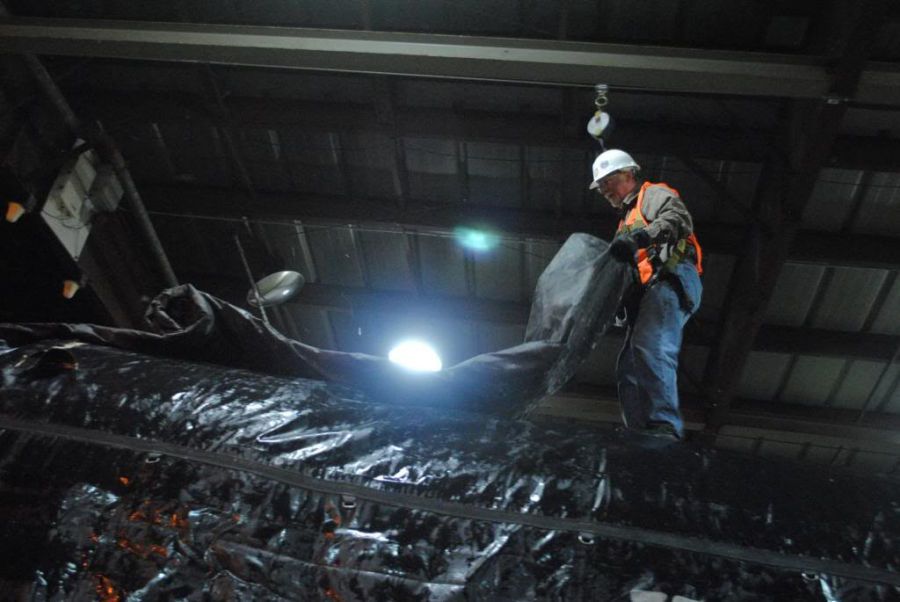
You should invest some time and take a look (it will take a while) at this thread from our archives...
Maybe it will give you an appreciation for what we do. I don't know, maybe it will scare you so badly that you'll run for the nearest job in a cubicle. I think you owe it to yourself to get over your fears, and avoid the great and mighty flood of misinformation that is on the internet. I have no way of knowing if you would enjoy this career or not. I can tell you one thing though, If you let your fears dictate your choices in life, then your life will be moderately safe and comfortable, and sadly disappointing.
I have hauled some construction equipment, and some oversized/overweight loads, but these days I am running a dedicated flat-bed account where I am 95% of the time hauling aluminum extrusions for SAPA HYDRO, a world wide company supplying aluminum extrusions to manufacturers all over the world. To answer your question, we don't have a transfer case that will give power to the front wheels. We can lock in an additional rear axle, and yes I have had to do that on plenty of job sites. This would be a typical load for me these days.
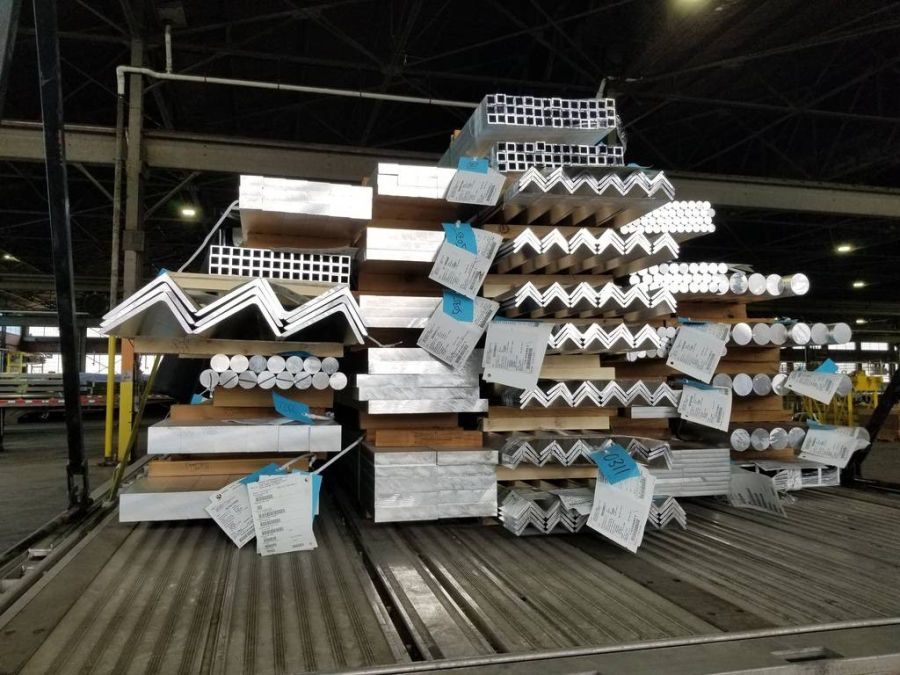
Continued...
SAP:
Substance Abuse Professional
The Substance Abuse Professional (SAP) is a person who evaluates employees who have violated a DOT drug and alcohol program regulation and makes recommendations concerning education, treatment, follow-up testing, and aftercare.
Interstate:
Commercial trade, business, movement of goods or money, or transportation from one state to another, regulated by the Federal Department Of Transportation (DOT).
HOS:
Hours Of Service
HOS refers to the logbook hours of service regulations.OWI:
Operating While Intoxicated
You also mentioned you aren't too interested in dealing with dirty nasty tarps. Well, I'll agree with you that there are days when I get myself covered in "tarp sludge," but it's part of the job. I loved what andhe78 said about his pride in his work. I get that same sense of pride when I have accomplished something worthwhile. I love traveling down the interstate and looking in my mirrors seeing a perfectly executed tarp job behind me, looking flawless as it travels down the road. Flatbedders have a sense of pride in their work that rivals many of the other truck driving jobs. They share more of a sense of camaraderie, and they are generally more willing to help each other with their jobs. They are unique in a sense, but not all of them are that way. One thing to keep in mind about flat-bedding... about fifty percent or more of the time I am pulling a Conestoga trailer. These things eliminate the need for tarping. They have a built in tarp system that rolls on wheels. They're great, and many flat-bed companies are using them to some extent. Here's a shot of my rig with a Conestoga wagon behind it.
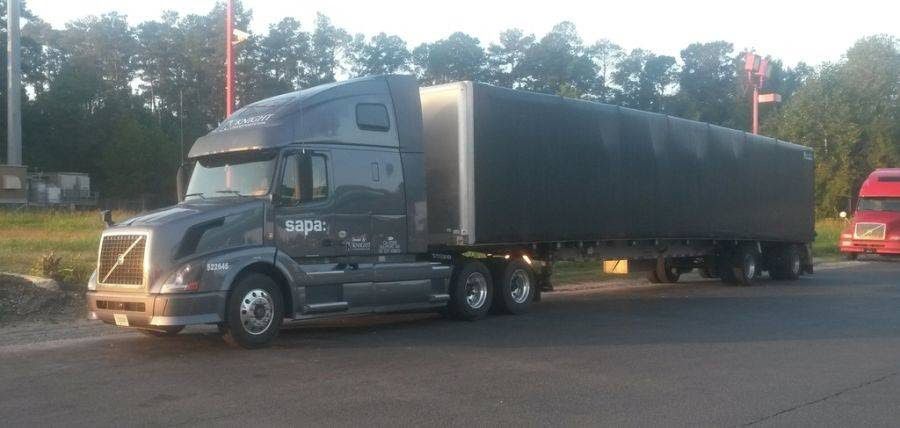
Interstate:
Commercial trade, business, movement of goods or money, or transportation from one state to another, regulated by the Federal Department Of Transportation (DOT).
Well, Old School, nicely put.
You mentioned that flatbedders are a special class in the truck-driving world. I've been told that about "submariners" in the navy. A special close-knit fraternity all of its own. I was in an army helicopter unit once. The flyboys had this attitude that "their excrement did not smell bad" to put it politely. But I can respect the work of flatbedders. If you say it's a tough job, not for lazy people, I do believe it.
Besides hauling big, yellow CATs, hauling cows in cattle trucks also seems quite special. I can even handle the smell.
I see no romance in hauling a load of manure, however, but I've always thought those hay trucks looked neat though I could never stand driving close to them with my windows down. Most of the ones I've seen in California have straw blowing everywhere and never a tarp on a hay truck.
HOS:
Hours Of Service
HOS refers to the logbook hours of service regulations.OWI:
Operating While Intoxicated
New Reply:
New! Check out our help videos for a better understanding of our forum features

















Preview:
This topic has the following tags:
Advice For New Truck Drivers Driver Responsibilities Flatbed Load Securement Safe Driving Tips Trailers Truck Driver Safety







 TT On Facebook
TT On Facebook
I feel for the driver who has to clamber up 13 feet off the ground to tarp a tall load and even do so out in nasty weather. A safe tarping system or station like this should be made an OSHA standard by federal law:
https://vimeo.com/114194465
PS - Dry van drivers always have use of a loading dock. Flatbedders should always have use of a safe indoor tarping station as industry standard.
Dry Van:
A trailer or truck that that requires no special attention, such as refrigeration, that hauls regular palletted, boxed, or floor-loaded freight. The most common type of trailer in trucking.